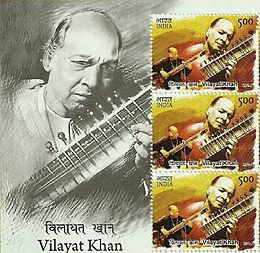Vilayat Khan facts for kids
Quick facts for kids
Vilayat Khan
|
|
|---|---|

Vilayat Khan on a 2014 stamp sheet of India
|
|
| Background information | |
| Birth name | Vilayat Khan |
| Born | 28 August 1928 Gouripur, Mymensingh, East Bengal (present day Bangladesh) |
| Died | 13 March 2004 (aged 75) Mumbai, India |
| Genres | Indian classical music |
| Occupation(s) | sitar player |
| Instruments | Sitar |
| Years active | 1939–2004 |
Ustad Vilayat Khan (born August 28, 1928 – died March 13, 2004) was a famous Indian classical sitar player. He was known for making the sitar sound like a human voice. This special style is called gayaki ang.
Vilayat Khan started playing music very young. He recorded his first song at just 6 years old. His last concert was in 2004 when he was 75. He also created music for several movies, like Jalsaghar (1958) and The Guru (1969). He even gave singer Kavita Krishnamurthy her first chance in the movie Kadambari (1976).
Contents
Early Life and Family Music
Vilayat Khan was born in Gouripur, which was then part of British India. Today, it is in Bangladesh. His family had been musicians for many generations. His father, Enayat Khan, was a leading sitar and surbahar player. A surbahar is like a bass sitar, playing lower notes.
Vilayat learned music in his family's special style, called the Imdadkhani gharana. A gharana is a school or style of music passed down through a family. This family style is also known as the Etawah gharana. It is named after a town near Agra where his grandfather, Imdad Khan, lived. This musical family goes back to the time of the Mughal Empire.
Sadly, Vilayat's father died when Vilayat was only ten years old. After that, other family members taught him. His uncle, Wahid Khan, taught him sitar. His grandfather, Bande Hassan Khan, taught him singing. His mother, Bashiran Begum, also guided his practice. His uncle, Zinde Hassan, helped him with his riyaz (daily practice).
When he was a boy, Vilayat wanted to be a singer. But his mother felt it was important for him to continue the family's tradition as a sitar master.
Amazing Performing Career
Vilayat Khan gave his first big concert at the All Bengal Music Conference in Kolkata. He played with the famous tabla player Ahmed Jan Thirakwa. In 1944, a newspaper called his performance "Electrifying Sitar."
In the 1950s, Vilayat Khan worked with instrument makers. He helped improve the sitar itself. He also liked to play without a tanpura drone, which is a background humming sound. Instead, he used his sitar's strings to fill the silence.
Vilayat Khan was great at playing traditional ragas (melodies). He also created some new ones, like Enayatkhani Kanada. He was known for his amazing improvisations. He could find new patterns in the ragas he played.
He was both a traditional player and a creative innovator. He is famous for developing the 'gayaki ang' style. This style made the sitar sound like a human voice singing. He also invented a technique where he would bend a note after plucking the string. This created a special sound effect that influenced many other sitar players.
Vilayat Khan recorded music for over 65 years. He also broadcast on All India Radio for almost as long. He was one of the first Indian musicians to perform in England after India became independent in 1951. He toured and performed in many parts of the world, including South Asia, China, Africa, Europe, and the former Soviet Union.
Besides performing, Vilayat Khan composed music for three movies. These included Satyajit Ray's Jalsaghar (1958) and Merchant-Ivory Productions' The Guru (1969). He won a silver medal for his music at the 1st Moscow International Film Festival.
Personal Life and Family
The Imdad Khan family comes from a Rajput background. Vilayat Khan's father, Enayat Khan, even used a Hindu name, Nath Singh. Vilayat Khan himself composed many songs using the pen name Nath Piya. He once said in an interview that his Rajput name was Kahan Singh.
Vilayat Khan lived much of his life in Kolkata. He was married twice and had four children. His first wife was Monisha Hazra. They had three children: Yaman Khan, the singer Zila Khan, and sitarist Shujaat Khan.
From his second marriage, he had one son, Hidayat, who is also a sitar player. Vilayat Khan's younger brother, Imrat Khan, was also a famous musician. Although they played together when they were young, they later had a disagreement. Vilayat's nephews, Rais Khan, Nishat Khan, and Irshad Khan, are also sitar players. His son Shujaat Khan continues the family's musical tradition.
Vilayat Khan had few students outside his family. Some of his well-known students include Kashinath Mukherjee and Arvind Parikh. He also taught Big Jim Sullivan, a famous English musician. He trained his daughter, Zila Khan, in both sitar and singing. Vilayat Khan also had homes in Princeton, New Jersey, as well as in Dehradun and Kolkata, India.
Death and Lasting Impact
Vilayat Khan passed away on March 13, 2004, in Mumbai, India, at the age of 75. He had been battling lung cancer, diabetes, and high blood pressure.
India's Prime Minister at the time, Atal Bihari Vajpayee, said that Vilayat Khan was a "child prodigy." He also said that Vilayat Khan helped bring the sitar's music to people all over the world. His contributions to Indian classical music are still celebrated today.
Discography
- Contributing artist
- The Rough Guide to the Music of India and Pakistan (1996, World Music Network)
- When Time Stood Still with Kishan Maharaj (2006, Navras).
 | George Robert Carruthers |
 | Patricia Bath |
 | Jan Ernst Matzeliger |
 | Alexander Miles |

